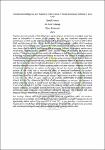| dc.description.abstract | Teachers in most schools of Lira City have registered poor performance in subject areas they
teach as exemplified in recent UNEB results. The city has continued registered poor
performance in USE results as the percentage of students in division 1V and 9 in 2013, 2014,
2015 and 2016 were 43.3%, 47.5%, 40.0% and 51.6% respectively (UNEB, 2017) implying
that, nearly half of students who registered for USE examinations in those years failed. Studies
have shown that Emotional Intelligence (EI) is a strong indicator of academic performance,
social skills, making positive decisions, and a general scene of wellbeing of students and
teachers. The teachers need to have emotional intelligence to help them in understanding aspect
of learning and using it for teaching and helping the students. The success of students depends
on effective teaching and emotional health of teachers play an imperative role towards that end.
The secondary school teacher of today need to display a balanced effective approach to interact
with the students and also for self-development in terms of research, administration and other
teaching related functions for effective academic gains and career success. However, the effect
of emotional intelligence on teachers’ performance has not been tested and documented. The
purpose of this study was to examine the effect of emotional intelligence on teachers’
performance in public secondary schools in Lira City. Specifically, the study focused on
establishing the effect of self-awareness on teachers’ performance in public secondary schools
in Lira City, the effect of social awareness on teachers’ performance in public secondary
schools in Lira City, determine the effect of self-management on teachers’ performance in
public secondary schools in Lira City and the effect of social skills on teachers’ performance
in secondary schools in Lira City. Using a cross sectional designs with stratified and simple
random sampling, 244 teachers participated in the study. Emotional intelligence and teachers’
performance were measured using validated self-report measures. The collected data were
analyzed through descriptive and inferential methods using SPSS23.
The findings indicate that social skills (p<0.01 B=0.339) significantly affect the teachers’
performance in Lira City, while self-awareness, social awareness and self-management do not
significantly affect teachers’ performance in Lira City. It was therefore recommended that
Organizations should train their managers/employees to acquire the competencies associated
with emotional intelligence and more emphasis should be put on social skills. | en_US |

